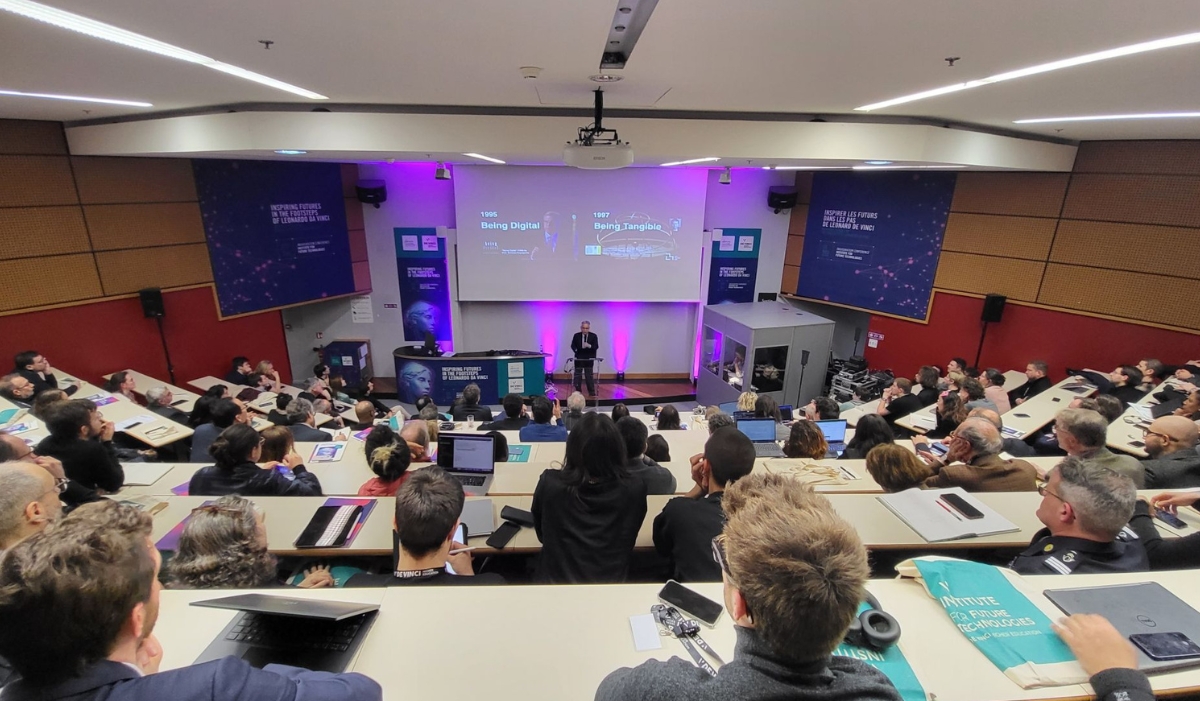At the beginning of March, De Vinci Higher Education inaugurated the Institute for Future Technologies (IFT), a new workspace dedicated to the invention and design of the technologies of tomorrow.
Inspired by the MIT Media Lab (Massachusetts Institute of Technologies), the IFT is structured around three complementary axes: The Devinci Innovation Center (DVIC), the FabLab, and the DeVinci Startup.
Moreover, as said by the MIT Media Lab in an article dedicated to the IFT on their website, several activities organized by IFT are geared towards establishing connections between French higher education and the MIT Media Lab and the wider MIT community.
One such initiative is the Instant Futures talks, a monthly series featuring researchers and practitioners, particularly alumni of MIT and the Media Lab.
The structure and mission of the IFT
IFT’s mission is to establish a complete value chain for developing new technologies: from conception to startup development and industrial production. But also to innovate for the equipment and technologies of tomorrow by responding to technological and environmental challenges and the needs of society and the economy.
Moreover, the IFT meets the ambition of De Vinci Higher Education by 2027 to move from simple academic research to RID (Research, Innovation, and Development).
A historical legacy: Transversality and transdisciplinarity, essential factors within IFT
Transversality is one of IFT’s critical assets. Interdisciplinarity is one of the main characteristics of De Vinci Higher Education. It brings together four complementary schools: ESILV (Ecole Supérieure d’Ingénieurs Léonard de Vinci), EMLV (Ecole de Management Léonard de Vinci), IIM (Digital School) as well as the professional training establishment DeVinci Executive Education, whose cross-disciplinarity plays a vital role.
With its internationally renowned programs and double degrees, it is logical that transversality is also present in the three entities that make up the IFT.
The IFT allows students, doctoral students, and teacher-researchers to evolve in a shared space that favors sharing knowledge and learning by doing. A method that favors “doing” and projects, a 600 m² workspace, and innovative teaching methods such as “radical learning,” interdisciplinarity, and collective intelligence is developed here.
An actual cross-disciplinary teaching and research center with 15 employees, including 7 Ph.D. students.
De Vinci Higher Education has created the IFT to encourage the hybridization of skills. Indeed, it is in the mix and diversity that we are creative, and this is the challenge of this institute: how to make these people work together and especially how to make them understand others. – Clément Duhart, Director of the IFT, in an interview with Smart Tech by B Smart.
In addition to educational excellence, democratizing advanced technologies
To democratize cutting-edge technologies, IFT teaches disruptive innovation concepts to advance RID and lead to the development of promising startups. As a result, students are coached to learn to act autonomously and build their entrepreneurial path by cultivating creativity and leadership.
Admittedly, this is quite a prolific project, as within DeVinci StartUp, between 50 and 100 startup projects have been identified since 2019.
A network of private and public partnerships in applied research
As a catalyst for innovations to be brought to market or industrialized via companies and startups, the IFT provides access to an entrepreneurs’ club with more than 45 members, five research chairs, and seven technology transfer contracts. It also develops collaborations with private and public partnerships in applied research.
New and future IFT initiatives
The year 2023:
Two new internationally oriented courses have been created: the M.Sc. Innovation & Creative Technology and the FabAcademy (an intensive digital fabrication training programme affiliated with the MIT Media Lab’s FabLab Network).
These new programs aim to develop products or use based on cutting-edge technologies and scientific knowledge. Cyber Dynamics: This is creating an innovation group within the DVIC dedicated to cybersecurity in partnership with Campus Cyber. This group will join the three existing innovation groups: Artificial Lives, Resilient Futures & Human Learning.
Shortly:
IFT plans to set up a financially supported startup accelerator.
This post was last modified on 2 May 2023 4:30 pm







